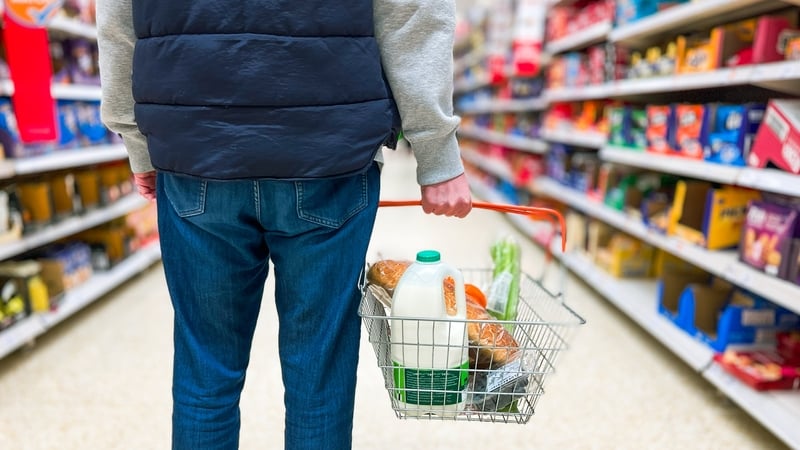There has been a sharp rise in the prices of a number of food and drink products over the past year, according to latest inflation figures from the Central Statistics Office.
The rate of food inflation since June 2024 has been more than double that of the general rise in prices across the economy (4.6% vs 1.8%).
The Consumer Price Index for June shows the average price of a pound (454g) of butter jumped by 28% – by €1.10 to €4.83 – from the same month in 2024.
The prices of other dairy products, such as two litres of milk (+27c to €2.47) and a kilo of cheese (+95c to €11.34), have also risen significantly in the last 12 months.
An 800g white sliced pan loaf of bread is 6 cent more expensive at €1.67.
Meanwhile, according to the CSO many meat product prices have also gone up.
A kilo of roast beef saw a 20% rise to €15.20, and a leg of lamb per kg is nearly 19% more expensive than this time last year at €17.70,
The CSO figures show that since June 2024 a pint of stout has gone up by 4.6% to €6.07.
However, some food & drink prices have come down, including a 2.5kg bag of potatoes (-29c to €3.81).
In general the prices of fruits and vegetables has not changed considerably since last year, according to the stats.
While the price of both petrol and diesel fell in the year to June.
The average price of a litre of diesel dropped from €1.71 to €1.65, with petrol falling 9 cent to €1.69.
We need your consent to load this rte-player contentWe use rte-player to manage extra content that can set cookies on your device and collect data about your activity. Please review their details and accept them to load the content.Manage Preferences
More demand for products
Commenting on the figures, Lecturer in Retail Management at Technological University Dublin Damian O’Reilly said “there’s the law of supply and demand and there is more demand for products than there was previously as we’ve got more people in the country”.
“Also, the supply isn’t there, because we’re producing less meat than we were previously. So the low supply and high demand would say that beef prices have to go up, and they’ve gone up dramatically.
“We can see that other input costs have gone up for the likes of dairy farmers, because of the increase in regulations around biodiversity and greenhouse gas emissions. So, that means there aren’t as many dairy herds as there were previously, which has pushed the price of milk up as well. That has a knock-on effect on the likes of cheese and chocolate prices,” he said.
The group representing grocery retailers, Retail Ireland, said its members “remain firmly committed to delivering value and choice for consumers, and to maintaining a fair, efficient, and competitive grocery retail sector”.
“Despite an increase in inflationary pressures in some categories over recent months, Irish food inflation trends remains below the EU average,” it added.
The Government has asked the Competition and Consumer Protection Commission (CCPC) to assess the grocery retail sector on pricing.
However, a CCPC probe two years ago found no evidence of excessive pricing in the sector and said there was strong competition.
Inflation significant over recent years – Taoiseach
The Taoiseach has said inflation was “significant” over recent years and although it has come down, food prices continue to be high.
“The message we have is that in terms of the next budget and the estimates process, like we did in previous budgets, we will continue to deliver packages that can support people in terms of the mainstream provision”
He said they will look at targeted measures to deal with those who are most vulnerable and “who would be under most pressure from the high increase in food prices”.
He also said resources have to be targeted and he wants to see child poverty addressed.
“I said it repeatedly that I want the next budget to have a program that’s targeted at child poverty in particular,” he added.




